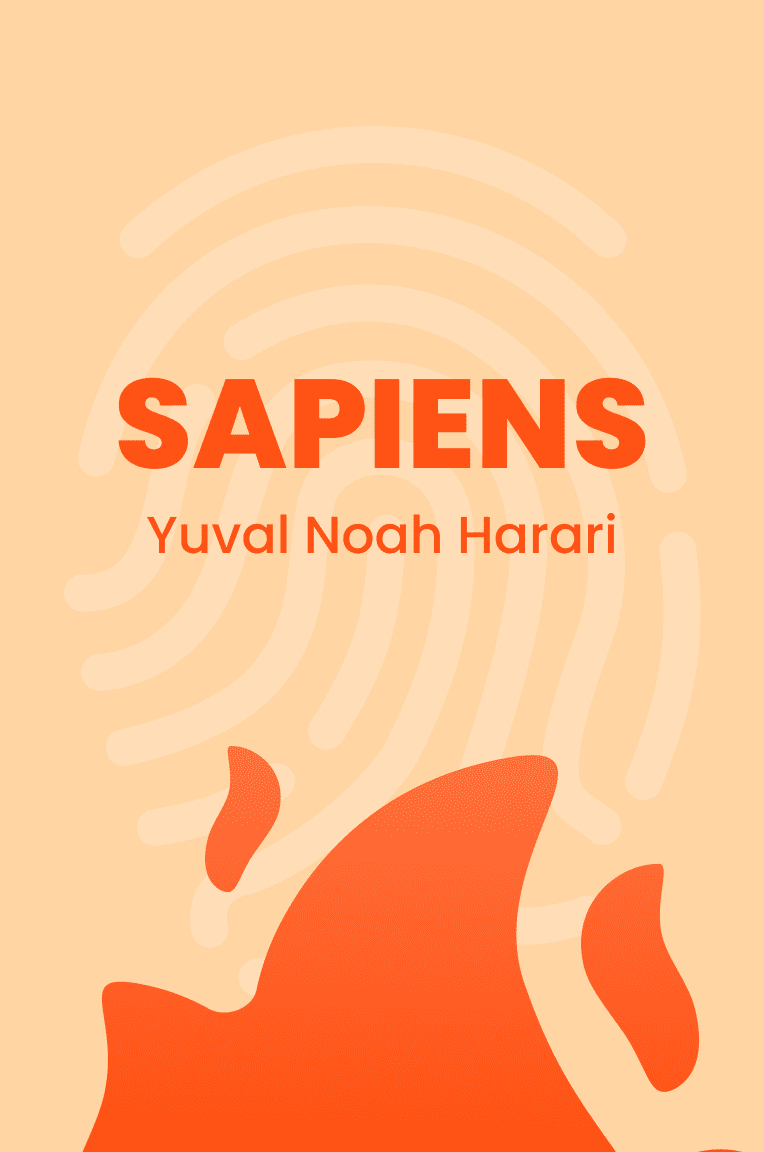Sapiens
Yuval Noah Harari
Overview
WHAT YOU WILL LEARN
In this reading, you will understand the journey from the beginnings of humanity to becoming architects of civilizations. With each page, you will discover how small changes in our cognitive abilities triggered agricultural and scientific revolutions, completely reshaping the world we know.
What have we sacrificed for progress? What future are we building? Harari invites us to question everything we take for granted, from our faith in money to our submission to technology. Prepare for a reading that challenges, enlightens, and may change the way you view history and yourself.
Key Points
Creators of History
Every reader of this book is a Homo sapiens sapiens, the wise species of the genus Homo. The distinctive feature of sapiens is their ability to create myths, thanks to their use of language and imagination. These myths are fundamental for large-scale cooperation and organization, enabling sapiens to dominate the planet.
The cognitive revolution, which occurred between 70,000 and 30,000 years ago, allowed the development of complex languages and the ability to share abstract ideas such as myths, legends, and religions. This unique ability enabled us to collaborate in large groups and form complex societies, something no other animal can do. We became the only species capable of talking about things we have not seen, touched, or smelled.
A more recent example is the French Revolution, which radically changed beliefs from the sovereignty of divinity to popular sovereignty. This capacity to adapt myths allowed sapiens to evolve culturally at a rapid pace, avoiding the slow process of genetic evolution.
It is remarkable how sapiens can quickly change their social structures and behaviors through cultural shifts, without needing genetic changes. Historical examples show that sapiens can radically alter their social behaviors in response to new ideas and myths without changes to their DNA.
When Food Changes Everything
The agricultural revolution, around 10,000 years ago, was a crucial moment in human history. Before this period, Homo sapiens lived by hunting and gathering, relying on what nature provided. With the adoption of agriculture, humans began to control and manipulate their environment. This change arose independently in various regions, starting with the domestication of wheat and goats, and expanding to include a variety of plants and animals. This resulted in a substantial change in diet and a dramatic increase in population.
The agricultural revolution not only transformed the human diet but also reconfigured social structures. Farmers lived in permanent settlements, reducing the size of their territories and altering human interaction with the environment. This change intensified the sense of ownership and belonging to a small but intensely controlled space.
The new lifestyle brought profound consequences. More sedentary societies with growing populations became dependent on limited crops, increasing their vulnerability to droughts and plagues. Agriculture imposed a heavier workload and fostered social hierarchies and inequalities. The concentration of resources led to the development of more complex political structures, giving rise to cities, states, and empires.
Agriculture freed humans from the uncertainties of hunting and gathering, providing the foundation for cultural and technological development. However, it also imposed a laborious and often oppressive existence on the majority, benefiting only a few. The agricultural revolution was a point of no return that fundamentally reshaped humanity's trajectory and continues to influence modern society.
What the Agricultural Revolution Left Behind
Since the agricultural revolution, humanity has evolved with increasing complexity. Each culture is a dynamic canvas, shaped by myths and fictions. In the 20th century, the perception of immutable cultures gave way to the idea of fluid and constantly changing cultures, influenced by exchanges and internal tensions.
An example of this dynamism is medieval Europe, where Christian ideals and chivalry coexisted, provoking wars and enriching art and literature.Today, the tension between freedom and equality continues to shape the global political landscape, reflected in debates over social policies and economic freedom.
Culture is an evolving process, a dance of ideas where dissonance drives creativity and change.The true essence of our civilization is not a set of unchanging certainties but a perpetual dialogue of beliefs and values. In this cognitive dissonance, we understand what it means to be human.
Stay updated
on all the news
Just leave us your email and we will notify you of all the updates.










